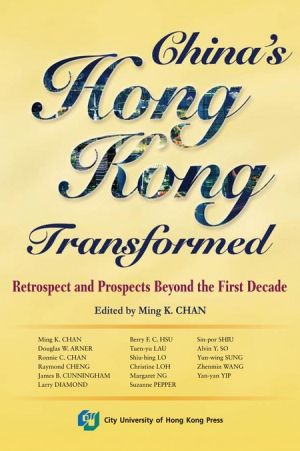China's Macao Transformed—Challenge and Development in the 21st Century
The return of Macao from the Portuguese administration to the People's Republic of China (PRC) in 1999 marks the beginning of its transformation in the 21st century. Macao was confronted with various issues concerning then existing political system, economic downturn and gangland violence during the transition period. Beijing put Macao under the "One country, Two Systems" and implemented a wide variety of measures in order to restore its law and order as well as to recover its tourism dependent economy. Gradually, Macao transformed itself to "Las Vegas of the East". This volume of 18 essays highlights the key dimensions of Macao's remarkable "One country, Two Systems" actualisation experience in its first 15 years, and discusses how Macao transformed and what challenges it encountered during its post-handover transformation.
The volume has several focuses. It first investigates the political and electoral issues in a critical manner─ post-handover Macao suffered from maladministration and limited democratization, and the chief executives selected lacked representativeness due to restricted public participation in the electoral process. Overall speaking, the government lacked legitimacy and popular support. From a socio-economic point of view, this book looks into the business model in running Macao's casinos and the emerging culture of mass participation and youth participation in political affairs. The education reformation and changes in civic identity of local Macao Chinese are also addressed. Finally, the volume looks into how post-handover Macao relates itself in the international politics affair.
Following the “economic miracle” of the first decade of gaming liberalization, the MSAR government must pay special attention to internal administrative reforms and longer term public policy articulation to ensure another decade of positive transformation to uplift the life of the Macao populace and the balanced, sustainable development of the community in both the hardware and software realms. In his 13 November 2012 Policy Address to the legislature, current MSAR Chief Executive Fernando Chiu has outlined a host of regime efforts to improve grassroots and middleclass livelihood (via tax rebate, senior welfare benefits, medical care voucher, electricity subsidy, students’ book/stationary grant, and above all, increased amount of direct cash payment (MOP8,000 for permanent residents and MOP4,800 for other residents). He also promised a new attempt at officials/civil servants performance assessment to enhance public service delivery efficiency and policy implementation effectiveness. If properly implemented, these measures would definitely help to promote meaningful social and administrative advancement in China’s Macao.


